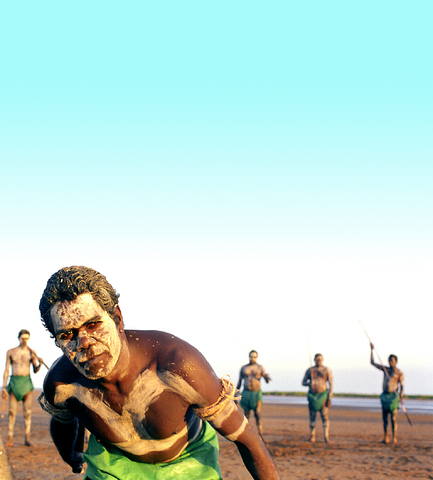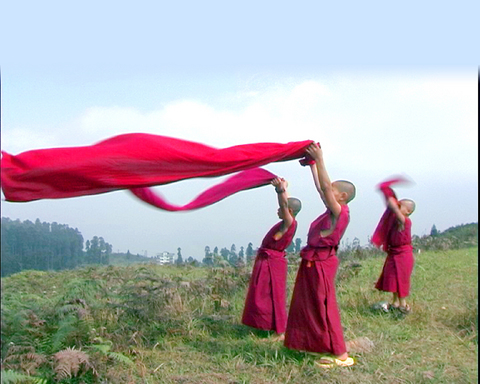Film-lovers who enjoy experiencing different lives in faraway places without leaving home will have a ball this weekend at the 2005 Taiwan International Ethnographic Film Festival (TIEFF). Founded in 2001, TIEFF is a biennial event that aims to broaden perceptions and encourage communication between ethnic groups and cultures through the medium of ethnographic cinema. Gaining international recognition from the past two events, the festival received more than 250 entries from around the world, and the best 37 films were selected for local audiences.
Choosing the theme of family variations for this year's programs, festival curator Lin Wen-ling (林文玲) said the aim is to present cultural differences and diversity from cross-cultural perspectives on families from various regions.
As a basic social unit, the family is not only closely related to kinship and marital systems, gender roles and customs, but also heavily influenced by social, economic, political and cultural conditions of society. Lin believes that an insightful understanding on the social construction of families can be gained from examining family relationships.

Among the line-up, US director Murray Nossel looks at the issues of gay parenting and surrogate motherhood through the portrait of a new type of American family in his Paternal Instinct. Bride Kidnapping in Kyrgyzstan tells of the story of the abduction of women in the Central Asian country. In Children by Remote Control, director Nahum Landau makes a provoking commentary on the globalization of labor through his knowledge of Thai workers who are torn between heavy economic pressure and their bonds with relatives back home. The Perfect Dream is a film-about-a-film conceived by a group of young refugees from the Third World living in Germany. In the film, they portray mafia members, but in real life, the young actors have to face hardship and misunderstanding in a foreign land.
This year's "Director Spotlight" will introduce two distinguished Australian directors, David and Judith MacDougall, and the late American master John Marshall. The MacDougalls are veteran filmmakers and scholars who have significantly influenced the theory and practice of ethnographic cinema. Two parts of the MacDougalls' renowned Turkana Trilogy, made in the 1980s, will be screened at the festival. Lorang's Way and A Wife Among Wives both examine the society of the semi-nomadic herders of northwestern Kenya and their polygamous marital structure.
In the program dedicated to John Marshall, as a leading figure in ethnographic cinema, the festival will present the first two films of his five-part series of A Kalahari Family that documents 50 years of the lives of tribespeople in South Africa's Karahari Desert. Marshall began his remarkable interaction with the tribe during his first trip to Africa in 1951 and followed closely the changing lives of the tribe members and also got deeply involved in the tribe's fight for the survival of their culture until the series was completed in 2002.

PHOTO COURTESY OF TIEFF
Apart from the family variations series three programs grouped under the theme of new vision will introduce works that examine various issues affecting human rights and indigenous cultures. Indigenous Perspectives presents award-winning films from Australia, Canada, China and Taiwan that document cultural conflicts and the political and social oppression faced by native tribes. The :"Human Rights and Autonomy" section includes What Remains of Us from Canada, a brave documentary about a young director who carried video messages recorded by the former spiritual and political leader of Tibet, the Dalai Lama, into the "largest prison in the world" and shot the film without the knowledge of Chinese authorities. Before the screening, the festival staff will ask the audience to leave all recording equipment outside the theater for the protection and safety of the people featured in the film.
Due to the tight budgets faced by most fringe festivals in Taiwan, the festival will show one screening per day for each film in its five-days. The organizer has invited more than half of the participating foreign directors to Taipei for an international exchange on ethnographic cinema and to hold question and answer sessions after each screening. For more information about the films and screening schedule visit TIEFF's bilingual official Web site at http://www.tieff.sinica.edu.tw.

PHOTO COURTESY OF TIEFF

Dissident artist Ai Weiwei’s (艾未未) famous return to the People’s Republic of China (PRC) has been overshadowed by the astonishing news of the latest arrests of senior military figures for “corruption,” but it is an interesting piece of news in its own right, though more for what Ai does not understand than for what he does. Ai simply lacks the reflective understanding that the loneliness and isolation he imagines are “European” are simply the joys of life as an expat. That goes both ways: “I love Taiwan!” say many still wet-behind-the-ears expats here, not realizing what they love is being an

Every now and then, even hardcore hikers like to sleep in, leave the heavy gear at home and just enjoy a relaxed half-day stroll in the mountains: no cold, no steep uphills, no pressure to walk a certain distance in a day. In the winter, the mild climate and lower elevations of the forests in Taiwan’s far south offer a number of easy escapes like this. A prime example is the river above Mudan Reservoir (牡丹水庫): with shallow water, gentle current, abundant wildlife and a complete lack of tourists, this walk is accessible to nearly everyone but still feels quite remote.

Google unveiled an artificial intelligence tool Wednesday that its scientists said would help unravel the mysteries of the human genome — and could one day lead to new treatments for diseases. The deep learning model AlphaGenome was hailed by outside researchers as a “breakthrough” that would let scientists study and even simulate the roots of difficult-to-treat genetic diseases. While the first complete map of the human genome in 2003 “gave us the book of life, reading it remained a challenge,” Pushmeet Kohli, vice president of research at Google DeepMind, told journalists. “We have the text,” he said, which is a sequence of

It’s a bold filmmaking choice to have a countdown clock on the screen for most of your movie. In the best-case scenario for a movie like Mercy, in which a Los Angeles detective has to prove his innocence to an artificial intelligence judge within said time limit, it heightens the tension. Who hasn’t gotten sweaty palms in, say, a Mission: Impossible movie when the bomb is ticking down and Tom Cruise still hasn’t cleared the building? Why not just extend it for the duration? Perhaps in a better movie it might have worked. Sadly in Mercy, it’s an ever-present reminder of just